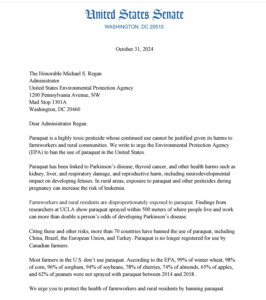US Congress members call on EPA to ban paraquat, citing risk of Parkinson’s and other diseases
More than 50 US lawmakers are calling on the Environmental Protection Agency (EPA) to join dozens of other nations in banning a widely used weed killer linked to Parkinson’s disease and other health dangers.
In an Oct 31 letter to the agency, seven US senators said that paraquat, a weed killer commonly applied on US farms, was a “highly toxic pesticide whose continued use cannot be justified given its harms to farmworkers and rural communities.” The call for a ban from the senators came after 47 members of the US House of Representatives sent a similar letter to the EPA calling for a ban earlier in October.
The lawmakers cite scientific links between paraquat use and development of Parkinson’s and other “life threatening diseases” as well as “grave impacts on the environment”. The lawmakers note that approximately 70 countries have banned paraquat.
“Numerous studies” have found that paraquat causes “serious health risks for workers who use the substance as well as the surrounding communities,” the lawmakers wrote. “These health risks include a higher risk of Parkinson’s disease, with some studies finding a 64% increase in the likelihood of developing Parkinson’s, non-Hodgkin’s Lymphoma, thyroid cancer, and other thyroid issues.”
Sen. Cory Booker, organizer of the Senate letter, said the risks of paraquat exposure are “well documented” and that it is “irresponsible” for the EPA to continue to allow its use. “I hope the EPA will follow the science and ban paraquat,” Booker said.
The congressional letters add to mounting pressure on the EPA to remove paraquat from the market.
 The EPA has long maintained that there is no “clear link” between paraquat exposure and Parkinson’s disease, though the agency does have a number of restrictions on use of the chemical due to its acute toxicity. The agency issued a draft report earlier this year affirming its position.
The EPA has long maintained that there is no “clear link” between paraquat exposure and Parkinson’s disease, though the agency does have a number of restrictions on use of the chemical due to its acute toxicity. The agency issued a draft report earlier this year affirming its position.
Still, the agency said at that time that it would be reviewing more scientific studies, and would issue a final report by January 17, 2025. Among the materials the agency said it was reviewing are scientific citations provided by the Michael J Fox Foundation for Parkinson’s Research.
The foundation provided the EPA with what it called recent “primary scientific research on the connection between paraquat and Parkinson’s”. It, and several other organizations, have litigation pending against the EPA over its continued approval of paraquat.
“There is compelling scientific evidence linking paraquat to Parkinson’s disease,” the foundation states in a public comment filed with the EPA. “In fact, paraquat is thought to increase Parkinson’s risk by 100 to 500 percent, depending on overall exposure,” the foundation wrote.
The foundation said that it is in the process of collecting signatures on a petition to the White House calling for a ban.
“Through years of legislative and community advocacy efforts, tens of thousands of people have shared personal stories with the Environmental Protection Agency and called for a ban of this harmful chemical linked to Parkinson’s disease,” said Ted Thompson, senior vice president of public policy at The Michael J. Fox Foundation for Parkinson’s Research. “On behalf of the 1 million Americans living with Parkinson’s, their families and caregivers, we remain committed to pushing the EPA to follow the science and ban paraquat once and for all.”
When asked about the congressional call for a ban, an EPA spokesperson said only that the agency “will respond to the letter appropriately.”
Several California lawmakers pushed for a ban in the most recent state legislative session, also citing the risks of Parkinson’s. A compromise measure signed by the governor last month requires an expedited regulatory review of paraquat.
The push to ban paraquat in the US is “long overdue,” said Ray Dorsey, a professor of neurology at the University of Rochester who studies the causes of Parkinson’s disease.
“For 60 years, paraquat has been helping fuel the rise of Parkinson’s disease,” Dorsey said. “The evidence from human, laboratory, and apparently even the company’s own research is overwhelming. When paraquat is banned, more lives will be spared the consequences of Parkinson’s.”
Australian regulators are also being pressured now to ban paraquat due to its connection to Parkinson’s. More than 30 neurologists recently submitted a petition to Australian regulators calling for a ban on the pesticide.
Chinese-owned Syngenta, the longtime maker and marketer of paraquat products did not respond to a request for comment about the congressional letters. The company has repeatedly denied there is any valid connection between Parkinson’s and paraquat.
But internal Syngenta documents revealed by The New Lede show the company was aware many years ago of scientific evidence that paraquat could impact the brain in ways that cause Parkinson’s, and that it secretly sought to influence scientific research to counter the evidence of harm.
Syngenta was allegedly aided in suppressing the risks of paraquat by a “reputation management” firm called v-Fluence, The New Lede reported in September.
Thousands of US paraquat users who suffer from Parkinson’s are currently suing Syngenta, alleging the company should have warned them of the risk of developing the incurable brain disease, but instead worked to hide the evidence of risk.
A class action lawsuit brought on behalf of Parkinson’s sufferers in Canada makes similar claims.
Syngenta has settled some claims that were set for trial and has successfully delayed other trials in multiple jurisdictions around the US. The company claims it is being targeted by a “Mass Tort Machine” led by plaintiffs’ lawyers making meritless allegations to try to pressure the company into costly settlements.
What would now be the first case to go to trial – if it is not also delayed – is scheduled to start March 31 in Philadelphia. Four more are set for Philadelphia next year, along with several more on court dockets around the US, including one set for May in Washington state.
Many of the plaintiffs are farmers who regularly sprayed paraquat on and around farm fields for many years. Syngenta’s Gramoxone brand of weed killer has been a popular choice for farmers growing crops and managing pasture.
Attorney Dave Dickens, whose Virginia law firm represents more than 1,000 plaintiffs, said there is abundant evidence that Syngenta intentionally misled paraquat users.
“What this evidence shows from the 60s, 70s, all the way up until today, is that the company is taking steps, time and time again to hide this information to minimize these risks, to deny that their product causes Parkinson’s disease… to make sure that this product stays on the market. And that it continues to be used by farmers without any knowledge whatsoever of the neurotoxic risks,” said Dickens.
“They knew nothing about the risks because the manufacturer made sure that they couldn’t figure that out,” Dickens said.
Among the evidence to be introduced at trial, according to Dickens, are documents indicating that Syngenta had biomonitoring studies showing that even when wearing recommended protective clothing, people spraying paraquat ended up with the chemical in their urine.
“They knew the protective equipment was not effective,” Dickens said. Combining that with scientific evidence that paraquat can cross the blood-brain barrier, creates a “cascading system of knowledge that’s just not out there in the public domain,” he said.
(Featured photo by Getty Images for Unsplash+)




